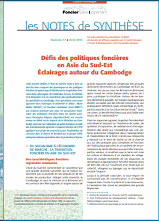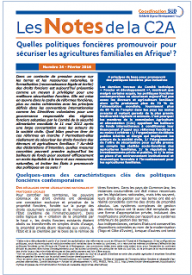tenure foncière
AGROVOC URI:
Défis des politiques foncières en Asie du Sud-Est : éclairages autour du Cambodge
Cette journée dédiée à l’Asie du Sud-Est visait à faire un état des lieux comparé des dynamiques et des politiques foncières de quatre pays d’intérêt pour la Coopération française dans cette région (le Cambodge, le Laos, le Vietnam et la Birmanie), et à en caractériser plus particulièrement les spécificités au Cambodge.
Enjeux fonciers en milieu rural, conflits civils et développement
Cette journée de réflexion a été consacrée à la place de l’enjeu foncier en milieu rural dans les conflits civils contemporains dans les pays en développement. Elle a mobilisé le réseau élargi du Comité, avec plus d’une cinquantaine d’experts, de chercheurs et de décideurs venus contribuer au débat. Jean-Pierre Chauveau et Éric Léonard de l’IRD-Pôle foncier de Montpellier ont assuré le cadrage général et l’identification des principaux intervenants.[…]
Gouvernance foncière : quel bilan quatre ans après l’adoption des Directives volontaires ?
Le 19 octobre 2016, à Rome, le Comité de la sécurité alimentaire mondiale (CSA) a organisé une session de suivi de la mise en œuvre des décisions et recommandations du CSA dédiée aux Directives volontaires pour une gouvernance responsable des régimes fonciers applicables aux terres, aux pêches et aux forêts (DV1), quatre ans après leur adoption.
Le pastoralisme, un mode de vie résilient face à de nombreux défis
L’élevage pastoral et agropastoral (ou pastoralisme) est un système de production basé sur un élevage extensif valorisant majoritairement les parcours naturels. Utilisé par des communautés qui vivent dans des contextes souvent marginaux, il est associé à un mode de vie fondé sur un lien particulier entre l’homme, l’animal et la nature.
Documenting Customary Tenure in Myanmar: A guidebook
This guidebook provides conceptual, legal and practical tools and resources to help civil society organizations guide communities through the process of documenting customary tenure at the local level. It also provides suggestions for how to build on the momentum generated by the documentation process to develop strategies and actions to defend, strengthen and promote customary rights at community, regional and national level. The guidebook was developed out of practical experience and conversations with local groups in Myanmar that have been documenting customary tenure.
Myanmar: Landlessness
In Myanmar, almost half of the rural population is said to be landless : it is the highest rate of landlessness in the Mekong region. With agriculture as the engine of Myanmar’s economy, employing more than two thirds of the population and accounting for one third of GDP, various studies in Myanmar provide contrasting figures on landlessness and indicate that the problem stems from a lack of clarity in the concept of landlessness.
La réforme foncière à Madagascar
Un projet de politique de réforme foncière a été adoptée en 2005 à Madagascar. Dans son objectif annoncé, la réforme vise à instaurer un système de formalisation massive des droits non – écrits, dans des délais courts et avec des coûts adaptés au pouvoir d’achat des ménages (essentiellement ruraux). Dans le fond, elle vise à concilier le légal et le légitime, par la reconnaissance des occupations coutumières de fait comme une présomption de propriété.
Persistence and change in Hakha Chin land and resource tenure: A study on land dynamics in the periphery of Hakha
The research provides a holistic overview of the key changes that affected Northern Chin society from pre-colonial times up to now in villages close to Hakha town where State penetration was stronger than in more remote
areas. The study sheds light on the overlapping and evolving statutory and customary land systems and on the issues faced by contemporary Chin communities as they seek to govern land and natural resources.
Quelles politiques foncières promouvoir pour sécuriser les agricultures familiales en Afrique ?
Dans un contexte de pression accrue sur les terres et les ressources naturelles, la formalisation (reconnaissance légale et écrite) des droits fonciers est aujourd’hui présentée comme un moyen à privilégier pour une meilleure sécurisation foncière.
Summary Report of the Second Regional Land forum
Following the success of the inaugural Regional Land Forum in Hanoi in 2016, the Second Regional Land Forum was held from 28-30th May, 2018, in Bangkok. The Regional Land Forum aims to provide a multi-stakeholder platform for networking and dialogue on land governance issues across the Mekong region, particularly Cambodia, Laos, Myanmar and Vietnam (CLMV).
Are intervention methods and systems used by agroecology advocates pertinent and effective ?
Agroecology being diverse and multidimensional, a broad range of issues were addressed such as the fundamental role of crop biodiversity, the highly preoccupying status of agrochemical use in the region, the need for appropriate-scale machinery, the importance of innovative and participatory intervention mechanisms, the recognition and integration of Indigenous Knowledge, the capacity building of the new generation, the marketing of agroecological products…
Three main take home messages emerged from all the discussions:





